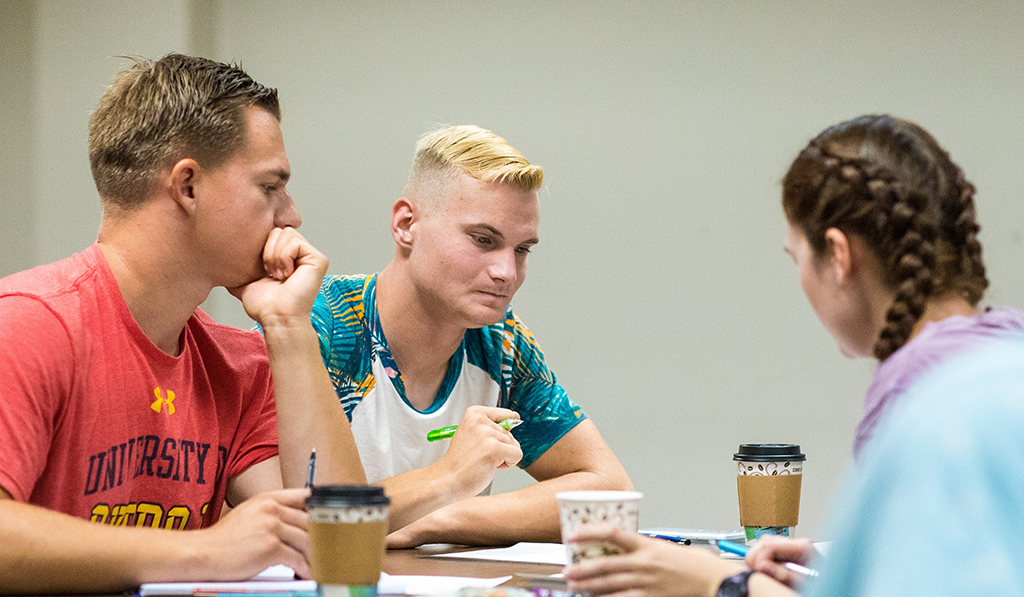
For many first-year students, there is apprehension about stepping into college academics. Am I ready? Did my high school education prepare me well enough? Do I have what it takes to succeed in college?
Student veterans who enroll in college following active duty also have some academic jitters. The difference? Student veterans have been out of a classroom anywhere from two to four years or more, serving their country. While deployed, their minds are chock full of details and data related to their important military assignments. Unfortunately, mathematical concepts from high school are usually buried deep in the recesses of their brains.
That’s where Math Boot Camp comes in.
Since the fall of 2018, Iowa State’s Department of Mathematics and the ISU Veterans Center have offered the university’s more than 800 student veterans an opportunity to brush up on their math skills during an intensive one-day course, called Math Boot Camp. The class, held just before the start of each semester, focuses on basic algebra and trigonometry concepts, skills that fade away without regular use.
“Speaking from personal experience, math can be a real barrier for student veterans returning to college,” said Hal Schenck, professor and chair of the Department of Mathematics, and Army veteran. “When you haven’t used math for a number of years, you get rusty.”
Schenck said up to 20 students attend Math Boot Camp each semester to get a jump start on their academic goals.
“By offering the boot camps, we’re making sure people have the resources they need to hit the ground running,” Schenck said.
Steven Streets (’21 industrial technology) served in the United States Marine Corps for four years prior to enrolling at Iowa State. His math skills were rusty, and the boot camp and additional tutoring sessions helped him quickly get up to speed.
“I was never strong in math, so this helped jog my memory since I had not done math for five years by the time I started college,” Streets said. “The boot camp helped me get the basics down and showed me what I needed to study before school started.”
Lauren Kopetzky (’20 biology) has served six years in the Iowa National Guard, currently as a sergeant. Math also intimidated her when she enrolled at Iowa State, but Math Boot Camp helped ease her anxiety.
“I have struggled with math my whole life, and I was so apprehensive about taking calculus at Iowa State,” Kopetzky said. “Math Boot Camp gave me not only a much-needed refresher in topics I had previously covered, but it also helped me look ahead at what I may struggle with.”
Jathan Chicoine, director of the ISU Veterans Center, is pleased with the math department’s commitment to the university’s veteran population.
“The Math Boot Camp and other tutoring sessions are a remarkable example of how the university’s colleges and departments can make a difference for our military-affiliated students,” Chicoine said.
BEYOND BOOT CAMP
Throughout the academic year, student veterans are encouraged to participate in math tutoring sessions held one hour before a weekly meal, provided by the Veterans Center. In addition, math teaching assistants offer 20 extra hours of review sessions prior to finals. Last spring, the math department also launched Calculus III Platoon, an additional weekly session focused on advanced calculus. Previous enrollment in the boot camp is not required to participate in the additional tutoring sessions.
Schenck and Elijah Stines, senior lecturer and associate chair in mathematics, teach students during the boot camp. Students from the mathematics graduate program are on hand to provide individual assistance during the boot camp and the study sessions, but Stines is the main architect of the program.
“The students who attend the boot camp are incredibly attentive and engaged,” Stines said. “It’s a joy to work with this dedicated group of students, and I hope that they are able to master a few new core concepts that will serve them well in their future studies.”
Read all the 2019 Math Matters stories